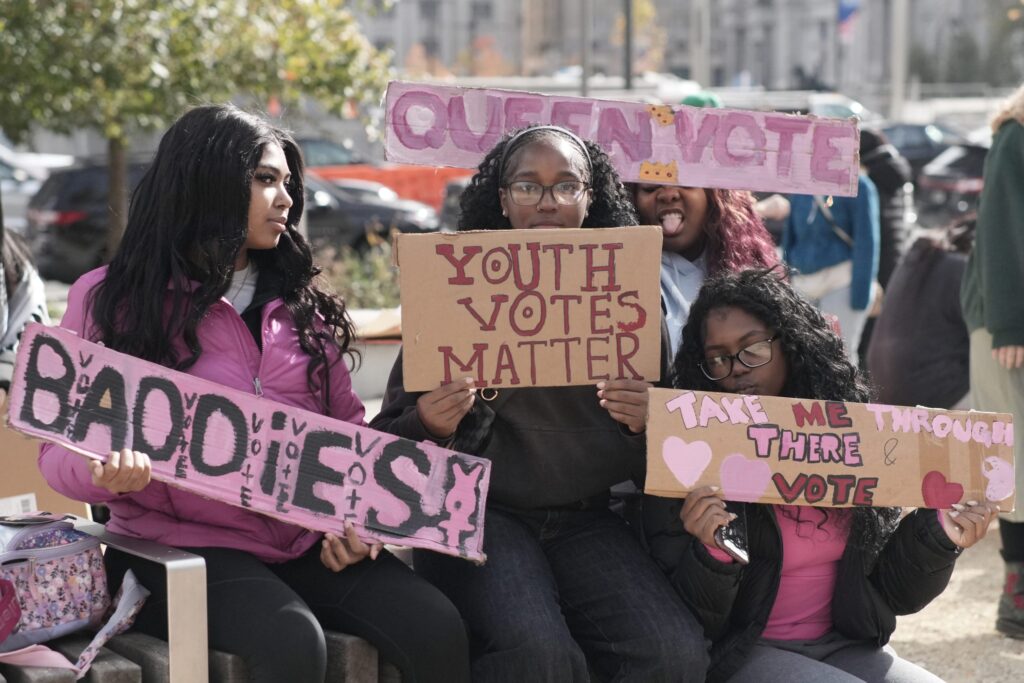Sarah-Julia Marion is passionate about civic engagement. When she started working with PA Youth Vote a statewide organization empowering youth to elevate their voices and votes during high school, she knew this would be a great way to expand on her mission. “It was a lot of promoting youth engagement within my class and within my peers, and trying to essentially get my peers who were eligible to vote out to be registered and to vote,” she said. Marion went to a private school in Philadelphia for her freshman and sophomore years, and then transferred to a public high school for her junior year. Now in college, she said she noticed a lot of her fellow students at the public school weren’t as engaged. “My peers were feeling that they were neglected by politicians and what was going on, and they felt like they had no say,” she said. “So the large demographic of my peers throughout high school were informed, but not informed enough to make decisions.” When Marion began advocating for the importance of political engagement for her peers, she noticed things began to change. Engaging Philly youth The impact of Philly youth voters can mean a lot to political campaigns. In 2024, voters between the ages of 18 to 24 made up about 10% of the total number of Philadelphia voters. Across Pennsylvania, more 18- to 24-year-olds showed up to vote in the November 2024 election than in previous years a whopping 54% of 18- to 24-year-old registered voters showed up to the polls that year, according to Kaiser Family Foundation data, compared to numbers as low as 11% a decade earlier. Keeping those young voters engaged while expanding interest is at the core of PA Youth Vote’s work, said Angelique Hinton, the organization’s executive director. During the election cycle, members from the organization a collection of organizers, teachers, educators, schools, youth and lots of grassroots organizations do everything from education sessions in schools to voter registration drives. “In Philly, we just completed our annual Vote Early Day: Give Us a Ballot march, which is where all of those students that we’ve engaged and registered have an opportunity to come down for a full day of engagement at City Hall,” Hinton said. The time between election cycles is important in maintaining active voters, though. The group, Hinton said, “comes together to make sure that young people are engaged year-round on the important role that electoral politics and civics has in their day-to-day lives.” Hinton’s work began right before COVID, she said. Tasked with working with Philly school teachers to register students to vote, “all the teachers I spoke to told me the same thing. They didn’t need me to register; they needed help helping the students understand why they should be voting.” So Hinton began to educate young people on voting and encourage engagement throughout the year. The success of this strategy led her to decide that this needed to be “more than just a moment.” From there, PA Youth Vote was born. Marion, the college student, said one of the organization’s most important duties is holding voting workshops at schools and training school staff about the importance of voting in the curriculum. “I think that’s the first big step we can take towards helping students get out there, because if it’s not really being taught in your classrooms, you’re not going to see it being implemented outside of the classroom,” she said. “I think everything that you learn builds from being created inside the classroom and then is taken outside and spread.” Rising turnout Among students, the most dramatic changes have been with the youngest voters, Hinton noted. “The turnout [for 18-year-old voters] was double any other Gen Z age in the primary and in the general [elections],” she said. “They outpaced regular turnout.” The engagement of these young people extends far beyond simply casting a ballot. “They’re not just registering,” she said. “They’re voting, they’re becoming ambassadors for the importance of being civically engaged to their peers, even to their parents.” And they’re taking leadership roles personally. “They’re also going on and running for president of the student body in their colleges and creating college opportunities to do voter registration, making sure young people know how to vote by mail,” she added. According to Marion, the student advocate from Philly, students at her public high school in Philadelphia often felt “neglected” by politicians, leading them to be less inclined to vote. “They felt like they had no say,” she said. Her work sharing information with PA Youth Vote helped, but she said more resources are needed, and it’s still an uphill battle to help youth understand the importance of voting and civic engagement. “There’s still a mixture of [students] being uninformed, but also not feeling like how to start or how to even get into things,” she said. Project 26 Pennsylvania is another organization focusing on civic engagement with young Pennsylvanians. Aimee Van Cleave, the state director of the organization said many younger voters are also facing new and different challenges. “By many measures, their life is worse for them than it was for their parents and grandparents,” she said. “Gen Z has been hit the hardest by inflation. They spend more on essentials and housing. They’re more likely, as recent college graduates, to be unemployed than the general population. And that’s not normal. That has been trending that way, but that’s not normal.” She said these younger voters often feel “let down” by elected officials and feel less motivated to vote or make changes. “They told us again and again that they don’t believe young people are the people who politicians are making decisions with them in mind,” Van Cleave said. “They told us that they actively believe that elected officials and leaders in general make decisions without thinking about young people or how this will impact them, or how to make their lives better.” She said voter turnout in the precincts closest to the schools where her organization’s volunteers work has increased in the last two years. “The one that I like to highlight in particular is Bright Hope [Baptist Church, in North Philly],” she said. “In 2021, we were looking at 30-some people who voted at Bright Hope. In 2025, we saw that number jump over 1, 000% [to 321].” Bright Hope is in the precinct that includes a “large chunk” of campus housing for Temple University students where Project 26 organizers do outreach, Van Cleave added. Founded in 2023, the group has noticed steady demand from young people demonstrating that they “are hungry” for someone to engage with them. “They’re looking for places where they can talk about what matters to them, share their interests and concerns, and evaluate where their values come from and what they do about those values,” she said. At any given time, Project 26 has up to 450 students working at colleges across the state, engaging their peers regarding all aspects of the voting process. “We hire students to go out and talk to their classmates, their friends, and their colleagues about what matters to them, and help them find opportunities to register to vote, successfully navigate their ballot, determine when and where they vote, and then get them over the finish line,” she said. Both groups aim to get students out to vote, regardless of political affiliation. Equitable resources Not all students get a thorough education on civics and government, noted Hinton, especially with school funding and resources distributed unequally across districts in Pennsylvania. She said organizations like PA Youth Vote help close this gap by providing free resources and information for students. The goal, she told Billy Penn, is “to try and provide equity to make sure they are also getting access to the importance of being a citizen and all of the responsibilities that come with it.” “We really need to do this if we want to see a government that is representative of and responsive to all of the communities they serve,” she added. She said the organization tries to prioritize education and resources for communities of color. She explained that schools in these areas tend to be historically underfunded. A big part of the organization’s work has been bridging the gap in engagement by showing youth how to contact elected officials and get involved in ways beyond voting. “We know that there are so many ways for young people to reach out to their representatives at the state and national level,” Van Cleave said. “In October, we had a big day of action where students across the Commonwealth were able to write postcards and share their stories in person and online with how the current economy has impacted them under this presidential administration, and reach out to their members of Congress to tell them what they hope to see to make that easier for them.” Beyond this, she said there are ways students can get involved outside of getting out the vote and electoral politics. That can include participating in unionization efforts. “Instead of kind of pressing the need for students to vote, and saying ‘you need to vote, and your voice matters,’ and seeing the same slogan that we hear everybody say to us as youth,” Marion said she found it was most important to “meet them where they were at and understand their thought process.” Hopefully, she says, these continued efforts will encourage her peers to use their voices however they see fit.
https://billypenn.com/2025/11/21/philly-youth-voter-participation-activism-increasing/
‘They had no say’: Why Philly youth voters are showing up in historic numbers

